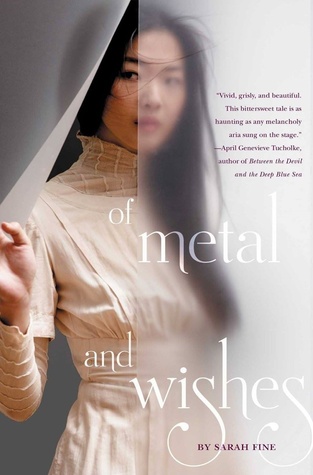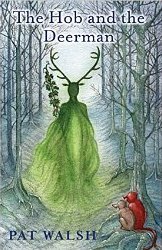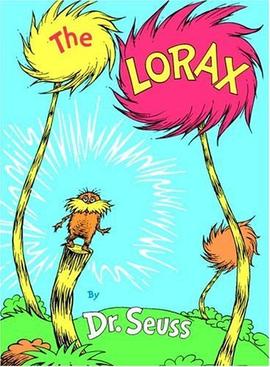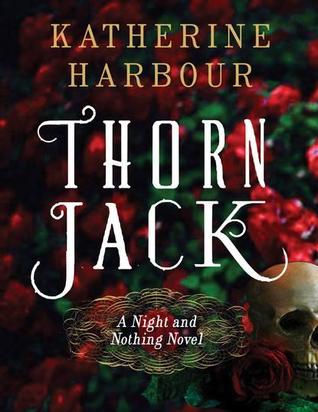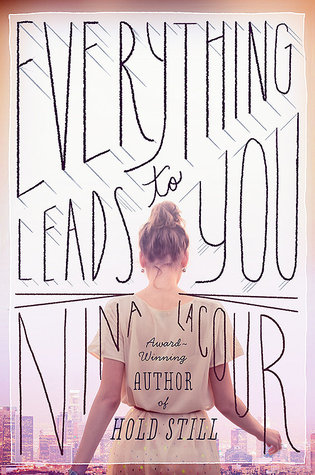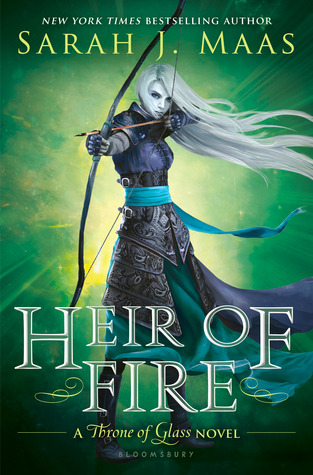It's been a while since our last book review, and that's partly my fault because I'm lazy and reviews (for me) take a long time. Not that I don't enjoy doing them! I do. It just takes a considerable time commitment - what can I say, I'm long-winded and think too much about stuff.
ANYWAY, I was very lucky to have received an e-ARC of one of YA's most popular recent fantasies: HEIR OF FIRE, the 3rd book in the THRONE OF GLASS series. The book is out now (yay!), so you won't have to wait at all post-reading this review.
We did a
joint mini-review of THRONE OF GLASS here in the past, and while we weren't particularly impressed with the first installment, we liked it enough to continue the series. I, for one, think it's an entertaining read, and I thought the follow-up CROWN OF MIDNIGHT was a marked improvement from ToG. I didn't review it here, but I did a
mini-review of CROWN OF MIDNIGHT on goodreads. (You can also find what I thought of the novellas on goodreads.)
So, here's what I thought about this latest entry into the series!
HEIR OF FIRE by Sarah J. Maas
Disclaimer: I received an e-ARC through Netgalley in exchange for an honest review. I also sometimes interact with Sarah Maas on Twitter (she's a sweetheart).
PROS: Expansive world-building; growing cast of intriguing characters; epic plot starting to really happen; focus on non-romantic relationships; pretty good pacing, especially considering how separated the main cast is and that this is a transition novel
CONS: This being a transition kind of book, the pacing does sag a little at parts; unnecessary number of POVs; kind of meh romance; a diversity/trope issue I'll explain below
Intellectual Rating: 7 out of 10
Emotional Grade: B
Goodreads blurb:
Lost and broken, Celaena Sardothien’s only thought is to avenge the savage death of her dearest friend: as the King of Adarlan’s Assassin, she is bound to serve this tyrant, but he will pay for what he did. Any hope Celaena has of destroying the king lies in answers to be found in Wendlyn. Sacrificing his future, Chaol, the Captain of the King’s Guard, has sent Celaena there to protect her, but her darkest demons lay in that same place. If she can overcome them, she will be Adarlan’s biggest threat – and his own toughest enemy.
While Celaena learns of her true destiny, and the eyes of Erilea are on Wendlyn, a brutal and beastly force is preparing to take to the skies. Will Celaena find the strength not only to win her own battles, but to fight a war that could pit her loyalties to her own people against those she has grown to love?
**
Warning: Spoilers for events through
Crown of Midnight from here on out.**
REVIEW:
I think this might be my favorite of the
Throne of Glass books so far, probably because it finally feels like we're getting into the
real story. In many ways ToG was mostly an introduction to the world and characters, and if you look at it, structurally it has the most self-contained storyline - the King's Champion competition. Whereas both
Crown of Midnight and now
Heir of Fire are books that are driven by how they feed into the series plot.
World-building
Heir of Fire is different from the past two books because it takes us outside of Adarlan, though some of the story does still stay there. At the end of CoM, Celaena was sent to Wendlyn, across the sea where magic still exists. I'd been curious about what Wendlyn's attitude towards the brutal expansion of Adarlan was, and perhaps more importantly, I had wondered what the Fae thought about the banishment of magic in Adarlan and the slaughter of their kin in Terrasen. So it was great to get answers to these questions, as well as just see what life is like in a kingdom un-oppressed!
The other locale we're taken to is up into the mountains where the King has gathered the Ironteeth Witch covens. What we learn here is more about the bigger plot, essentially that the king has wyverns, and we meet a new set of players in the game. The witches and their culture are fascinating with its brutality, yet strict governing system. I loved Manon Blackbeak - a new character who is obviously going to be integral to the series plot in the future - and her Thirteen.
New Characters
The new characters introduced in this installment were very intriguing, and they add layers to the dangerous game that's being played. Although, I will say that I don’t think all the POVs we got in this volume were necessary. As I mentioned above, I loved Manon Blackbeak and her Thirteen. I think the Witch Clans will definitely be something of a wildcard element to the series arc that's being spooled out, and while I didn't find this POV superfluous, it is the most tangential of the main stories being played out.
Other new characters, Aedion and Ren play roles that are more straightforward, but they definitely upped the tension in regards to what is brewing in Adarlan and Rifthold. I enjoyed the addition of the Fae warrior prince Rowan. Not only did he give us a glimpse of what the Fae are like and what controlled magic looks like, he gave Celaena the kind of tough love that I think she needed. He also was one of the more intriguing new non-romantic relationships introduced in this book. I'm very curious as to how he will fit into the series plot moving forward.
Old Characters
There wasn't as much Dorian in this book, which was sad for me (since I love him), but it made sense considering how his role has been diverging from Chaol and Celaena’s since the last book. He has his own problems to deal with, and given what he doesn't know, it's hard for him to be involved with the bigger arc. That isn't to say he's been side-lined because where this book takes him is, well, it's not pretty and it certainly has me waiting with bated breath as to what will happen next.
Chaol too has a tough time in this book, more so than Dorian because he's a man torn between his loyalties to his friends, country, and family. I did not envy his position, but I was pleased with how he has been forced to really examine his beliefs and feelings. His world get shaken up in this one too.
Last but not least, our MC Celaena Sardothien! It was great to see Celaena explore the magical and Fae part of her heritage now that it's out in the open about who and what she is. I do wish (as I have in other books) that Celaena gave more indication of what was going on in her inner life. I understand that she's spent 10 years repressing her memories and that hiding her past is how she has survived - and I also understand the concept of unreliable narrators and having to keep plot information from the audience - but it still (even in this 3rd book) strikes me as odd the way Celaena doesn't seem to internally acknowledge or react to potentially triggering stimuli (other than in maybe the vaguest of terms) until the story calls for it.
The example I always come back to is her fear of the king. In one of the last novella prequels to ToG, she suddenly expresses knee-wobbling fear of the King of Adarlan. Yet the first time I am aware of any kind of visceral fear from her is this moment in the last novella, despite Celaena's having lived lived in the Capitol city within sight of the Glass Castle for the past decade and having to think about and/or talk about the king at least in passing. I guess, for me, when a character seems
that afraid of someone/thing, it's weird when they give no indication of it... until the plot absolutely calls for it.
Anyway, that personal nitpicky feeling aside, I do appreciate that this book was about Celaena finally facing her inner demons and coming to terms with both her failures (perceived and otherwise) and her responsibilities. She frustrated me at many turns, but I also felt for her and understood why she didn't want to accept certain things and why she kept running away. In my mini-review of ToG, I said I felt like I knew Celaena only on a shallow level, but in this book, she's finally starting to feel more real to me.
I think Maas did a good job making Celaena believable, and though there were many times I wanted to shake her or yell at Celaena, I was still waiting and hoping for her to pull through. I didn't want her to fail, and I think keeping people on the side of frustrating characters is a feat in and of itself for authors.
Pacing
This book is very much a transition book, so there's not real driving plot. It's mostly character arcs and laying the groundwork for the series plot-line. That isn't to say there isn't a mystery and some action set-pieces. There is - with Celaena's story being rightfully the meatiest. I think the various threads we're given help keep the tension and the pacing up.
But it
is a long book, so I think there are some sections that run a little slower than others. It also depends on what interests you as a reader. I've seen some people say the witch sections are the slow sections since they have the least to do with everything else, but I found the witch politics, Manon, and the wyverns captivating. On the other hand, I found the Sorscha (another new character) POV sections a bit pointless. Her role in the story is important, but I wasn't sure if she needed a point of view - though it did lend a bit of sweetness to an otherwise darker book.
One gripe: Trope
This gripe isn’t a deal-breaker and I obviously don't think it was a trope that was planned, but I do think it’s important to note. Given Nehemia’s fate in the last book, I was not happy with the way Sorscha’s story line went because taken together, these two characters fall into a very common trope that happens to characters of color in fiction. They can be great characters -
beloved characters- but ultimately, the role they serve is to further the plot and/or character arcs of the white protagonists.
Sorscha is one of the new characters introduced in this book, and the only one who sounds like a non-white character (at the very least, she has darker skin). (Yes, I know, some of the new characters are witches and Fae and whatnot, but they’re all described as pale-skinned, pale-haired, and exotic-eye colored - which will be interpreted as white-looking first.) She has a POV and plays a pretty important role, but when it comes down to it, the only real purpose she serves is to further the story and character arc for Dorian, and on a smaller scale for Chaol and the series storyline.
(Picture references for Sorscha from Maas' ToG pinterest board.)
I get that all supporting characters are basically there to forward the story for the MCs, but Sorscha seriously is a love interest and a plot point and that's it - which is why I found her POV sections kind of unnecessary (short and infrequent as they were). Anything we learn from her POV could easily have been transmitted through other characters or methods. And it would be fine if supporting characters are just there to support, but it falls into problematic territory when it's only the non-white characters who occupy this category without becoming anything else (Nehemia seemed to have more going on, but Sorscha is firmly in the supporting character - and not really much else - category).
This isn’t to call out or condemn this book series or anything. It’s just to point out a common but problematic trope in story-telling media at large. To give you another good, recent example, the wildly popular
Hunger Games does this too with Rue (specifically in the movie, where Katniss loses the racial ambiguity she had in the book). She was a memorable and well-liked character, but more importantly, Katniss liked her. In the end though, her role in the story was to help Katniss not only survive the Hunger Games but to start becoming a symbol for the rebellion. Her friendship with Katniss is what made Thresh save Katniss’ life later in the Games. Her death drives home the brutality of the Capitol and the Games to Katniss and to the reader. It inspires Katniss’ acts of defiance, which in turn stoke the fire of the rebellion. The most important thing about Rue is not even what she stood for (i.e. innocence) but what she does for Katniss.
And that’s what sucks about both Nehemia (who I think was a great character) and Sorscha. They are basically the two most important characters of color in this series to date (all other dark-skinned people mentioned are the nameless people of Adarlan conquered nations), and this is what they do for the story.
*Highlight the section below for
Crown of Midnight and
Heir of Fire spoiler*
And out of the growing cast of characters, the two named women of color are the ones who get fridged in service to the plot and angst of the protagonists (who are white). I mean, even typical “mean girl” Kaltain from Book 1 is alive and out in Erilea somewhere, likely to re-emerge in a big way in later books! And I don’t know if I find it ironic or just plain troubling that Nehemia herself thought -within the story!- that she would be of more use to the rebellion (and Celaena) dead than alive. That’s like the trope incarnate - plotted and executed by the character herself!
So that’s disappointing, especially since I think the ToG series does a lot of other cool things (e.g. focus on female relationships, platonic relationships, badass heroine who is also very feminine). There are 3 more books in this series though, so I only hope that we get more non-white looking people who actually, you know, stick around and get to be part of the story in the way I had hoped Nehemia would be part of it or in the way Manon is obviously going to be part of it.
CONCLUSION:
Overall though, I think Sarah Maas outdid herself in this installment. I think she improves with each book, and I love that the world keeps expanding and feeling more real as we see more of it. And again, I still think this series is a great, accessible way to get into the Fantasy genre for casual and new fantasy readers.
When Celaena's plot for this book came to a close, it had me wishing I had the next one. In fact, the place where Maas leaves the main characters has me so, so excited for the next book. Yes, this volume was more like a bridge to the real story, but it sets up so many intriguing things. Decisions have been made, people are in very different places from where they started. Very much looking forward to the next!
P.S. Chat me up for book discussions when you've finished reading this because oh my gooooooood.
















